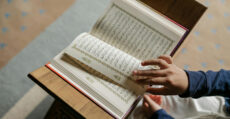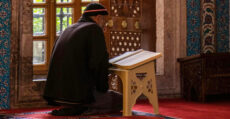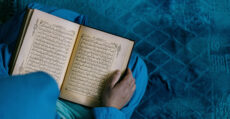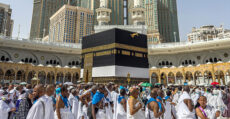Reference: al-Mulakhkhas al-Fiqhee – Volume 1, Pages 265-267
Allaah (Subhaanahu wa Ta’aala) says:
1) {It is made lawful for you to have sexual relations with your wives on the night of As-Sawm (the fasts). They are Libaas [i.e. body cover, or screen, or Sakan, (i.e. you enjoy the pleasure of living with her), for you and you are the same for them. Allaah knows that you used to deceive yourselves, so He turned to you [accepted your repentance] and forgave you. So now have sexual relations with them and seek that which Allaah has ordained for you (offspring), and eat and drink until the white thread (light) of dawn appears to you distinct from the black thread (darkness of night), then complete your Sawm (fast) till the nightfall}, [Soorah al-Baqarah, Aayah 187]
Regarding this, Imaam Ibn Katheer said:
«This is ease [which has been bestowed by Allaah] upon the Muslims and they were alleviated of this since Islaam was still in its early days. So it was the case that whoever completed his fast, then he was permitted to eat, drink and have sexual intercourse [with his wife] until the ‘Ishaa prayer or if he slept before that time. So, when he slept or performed the ‘Ishaa prayer it became prohibited for him to eat, drink or have sexual intercourse [with his wife] until the following night. As a result, they found much difficulty in this, so then this aayah was revealed whereby they were extremely happy since Allaah had [now] permitted them to eat, drink and have sexual intercourse [with their wives] throughout any part of the night until a such time that the morning light could be distinguished from the darkness of night»
The limits are clear, from the noble aayah, as regards the daily fast and it’s start and finish. It starts from the adhaan of the Fajr prayer and finishes at sunset [at the time of the adhaan of the Maghrib prayer].
The permissibility of eating and drinking [throughout the night] until the time of Fajr prayer is evidence of the recommendation of taking the suhoor (pre-dawn meal). It is mentioned in Saheeh al-Bukhaaree and Saheeh Muslim in the hadeeth of Anas رضي الله عنه, who said:
«Take the pre-dawn meal, for indeed the pre-dawn meal is a blessing»
And there are many narrations encouraging the observance of the suhoor, even if it were a mouthful of water. And it is recommended to delay it until [a short time] before the time of Fajr enters.
Even if a person were to wake up in a state of janaabah or if a woman had completed her menstrual cycle before the time of Fajr, then they should first partake in the suhoor and fast, thereby delaying their ghusl until after the time of Fajr had entered.
There are some people who are prompt in taking the suhoor and remain awake most of the night eating, whereupon they go to sleep a few hours before the time of Fajr. Due to this, the people have committed a number of errors:
Firstly: Because they have started to fast before the legislated time;
Secondly: They abandon the Fajr prayer in congregation [in the masjid] and thereby commit a sin by leaving that which is more obligatory upon them, that being the congregational prayer;
Thirdly: It is quite possible they delay performing the Fajr prayer by not performing it until after sunrise. And this is extremely dangerous and more sinful, as Allaah (Subhaanahu wa Ta’aala) says:
{So woe unto those performers of Salaah (prayers) (hypocrites). Who delay their Salaah (prayer) from their stated fixed times}, [Soorah al-Maa’oon, Aayah’s 4-5]
It is imperative to make the intention for the obligatory fast during the night prior to the fast. So if he were to make the intention and did not wake up until after the Fajr prayer, then he is required to abstain from all that breaks the fast and as such his fast is correct and complete, in shaa.-Allaah.
It is recommended to hasten to break the fast once it is confirmed the sun has set, either by witnessing it’s setting or if someone trustworthy was to inform that it has set or if the adhaan for the Maghrib prayer is called or by other [trustworthy means] than this.
It has been narrated on the authority of Sahl ibn Sa’d that the Prophet ﷺ said:
«The people will continue to remain in good so long as they hasten to break the fast»
It’s authenticity is agreed upon by both al-Bukhaaree and Muslim.
And the Prophet ﷺ narrates on behalf of his Lord (Subhaanahu wa Ta’aala), who said:
«Indeed, the most beloved of my servants to me is the one who hastens to break the fast» (…this is once the sun has set).
It is from the Sunnah to break the fast with fresh dates and if these are unavailable, then the dry dates. If these too are unavailable, then with water. This is based upon the saying of Anas, who said:
«The Prophet ﷺ used to break his fast with fresh dates before he prayed [the Maghrib prayer]. And if he did not have fresh dates, then with dry dates. And if he did not have dry dates, then he would take sips of water…»
This is transmitted by Imaam Ahmad, Abu Daawood and at-Tirmidhee.
And if one was unable to find fresh dates, dry dates or even water, then he is to break his fast with whatever is available from food and drink.
I wish to make mention of a very important issue here and that is that some people remain at the dinner table and continue to eat until they have had a full meal. As a consequence, they do not perform the Maghrib prayer with the congregation in the masjid. In doing this, they fall into a great sin since they have missed the congregational prayer and thereby forfeited much reward and as such are befitting of punishment.
That which is legislated is that the fasting person breaks his fast and then proceeds to perform the Maghrib prayer, after which he returns to have his full and proper meal.
At the time of breaking the fast, it is recommended to supplicate to Allaah with all that one wishes of good, because the Prophet ﷺ said:
«Indeed, the supplication of the fasting person at the time of breaking the fast is not rejected»
And from the supplication which is mentioned is as follows:
«O Allaah, I have fasted for you and with that which you have provided me I break my fast»
And the Prophet ﷺ used to say:
«The thirst has gone and the veins are moistened, and reward is confirmed, if Allaah wills»
And like this, it is befitting for the Muslim to learn the rulings pertaining to the fast and breaking it – in terms of the time and manner, such that he is able to fast according to that which has been legislated in adherence to the Sunnah of the Messenger of Allaah ﷺ. In doing so, his fast will be correct and his actions acceptable to Allaah (in shaa.-Allaah). Indeed, this is from the most important of affairs as Allaah (Subhaanahu wa Ta’aala) says:
{Indeed in the Messenger of Allaah (Muhammad) you have a good example to follow for him who hopes in [the Meeting with] Allaah and the Last Day and remembers Allaah much}, [Soorah al-Ahzaab, Aayah 21]





